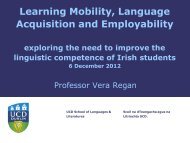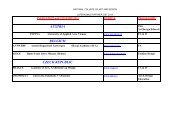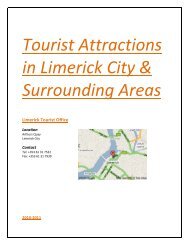See the National Diploma Supplement Template - Europass
See the National Diploma Supplement Template - Europass
See the National Diploma Supplement Template - Europass
You also want an ePaper? Increase the reach of your titles
YUMPU automatically turns print PDFs into web optimized ePapers that Google loves.
There are thirteen Institutes of Technology (IoT) which are designated under State legislation. They<br />
provide programmes leading to awards at NFQ Levels 6 - 10. The Institutes of Technology make <strong>the</strong>ir own<br />
awards at specified levels under delegated authority from HETAC.<br />
The Dublin Institute of Technology (DIT) has <strong>the</strong> authority to make its own awards at NFQ Levels 6 - 10.<br />
While DIT has primary responsibility for <strong>the</strong> implementation of quality assurance procedures, <strong>the</strong> NQAI<br />
has a statutory quality review role in relation to <strong>the</strong>se procedures.<br />
O<strong>the</strong>r providers of higher education and training may apply to HETAC for approval of <strong>the</strong>ir quality<br />
assurance procedures and subsequent validation of <strong>the</strong>ir programmes. While such providers have primary<br />
responsibility for quality assurance, HETAC has a statutory role in quality assurance monitoring and<br />
review. Fur<strong>the</strong>rmore, any person may apply to HETAC for an award based on <strong>the</strong>ir lifelong learning<br />
achievement without reference to a programme of higher education and training.<br />
The European Credit Transfer and Accumulation System (ECTS) has been incorporated into <strong>the</strong> awards<br />
systems of HETAC, <strong>the</strong> Institutes of Technology, DIT and <strong>the</strong> Universities and most programmes are<br />
ECTS compatible. ECTS is a learner-centred system for credit accumulation and transfer based on <strong>the</strong><br />
transparency of learning outcomes and learning processes. It aims to facilitate planning, delivery,<br />
evaluation, recognition and validation of qualifications and units of learning as well as student mobility.<br />
<strong>National</strong> Framework of Qualifications (NFQ)<br />
In terms of higher education and training, <strong>the</strong> NFQ sets <strong>the</strong> overall standards for all higher education and<br />
training awards. It is <strong>the</strong> single, nationally and internationally accepted entity, through which all learning<br />
achievements may be measured. It also defines <strong>the</strong> relationship between all education and training awards.<br />
It is a 10-level framework based on learning outcomes that are determined by standards of knowledge, skill<br />
and competence. Higher education and training awards are at NFQ Levels 6 to 10 and may be made by<br />
HETAC, DIT, <strong>the</strong> Universities and Institutes of Technology with delegated authority. The framework<br />
consists of 16 major award types with minor and special purpose awards available at each level and<br />
supplemental awards available at NFQ Levels 4 to 10. All awards included in <strong>the</strong> Framework are<br />
underpinned by legislative quality assurance arrangements. The major awards of <strong>the</strong> NFQ are set out<br />
below toge<strong>the</strong>r with <strong>the</strong> alignment to <strong>the</strong> ‘Bologna’ Framework and <strong>the</strong> draft alignment to <strong>the</strong> European<br />
Qualifications Framework (EQF):


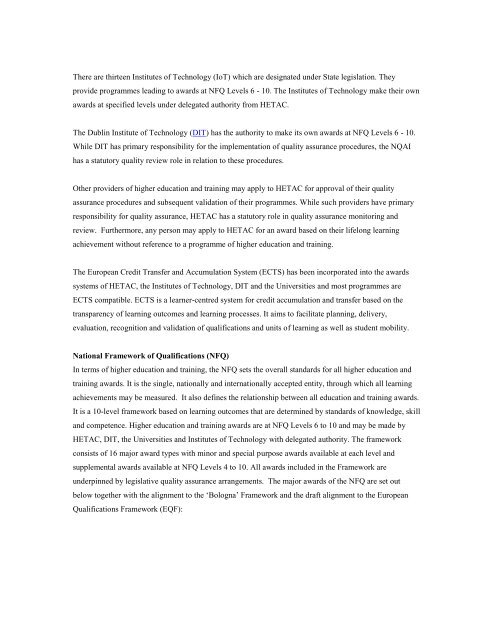
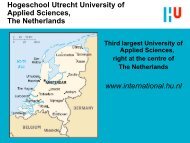
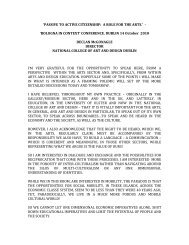

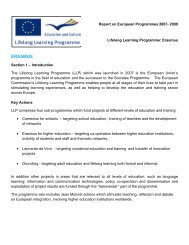



![Fiona Killilea [Compatibility Mode] - EURIreland.ie](https://img.yumpu.com/29112845/1/190x135/fiona-killilea-compatibility-mode-eurirelandie.jpg?quality=85)
